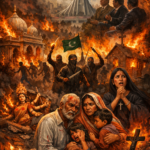Introduction
India is the largest democracy in the world and is admired globally for its vibrant and robust democratic system. It is a country where diverse religions, cultures, languages, and ethnicities coexist and participate in the democratic process. Despite challenges like poverty, illiteracy, corruption, and regional conflicts, India has managed to uphold its democratic values and principles. In this paper, we will explore why the world admires India’s democracy and how it has evolved over the years.
Historical Background
India’s democratic journey began in 1947 when it gained independence from British colonial rule. The Constitution of India was adopted in 1950, and it enshrined the fundamental principles of democracy, secularism, and social justice. India’s democracy was put to the test in 1975 when then-Prime Minister Indira Gandhi imposed a state of emergency and curtailed civil liberties. However, the resilience of India’s democracy was evident when the emergency was lifted in 1977, and free and fair elections were held.
The Essence of Democracy
Inclusiveness: Indian democracy is inclusive in nature, giving equal opportunities to every citizen, regardless of their caste, religion, gender, or economic status, to participate in the political process.
Freedom of speech and expression; The Constitution of India guarantees the right to freedom of speech and expression, allowing citizens to express their opinions and ideas freely.
Rule of law: Indian democracy operates under the rule of law, where every citizen is equal before the law and no one is above the law.
Independent judiciary: India has an independent judiciary, which acts as a watchdog against any violations of the Constitution and protects the rights of citizens.
Federal structure: India has a federal structure of governance, where power is divided between the central government and the state governments, providing a healthy balance of power.
Regular elections: Indian democracy holds regular elections, giving citizens the opportunity to choose their representatives and hold them accountable.
Political stability: Despite its diversity, India has been able to maintain political stability and has continued to function as a democracy for over seven decades.
Political pluralism: Indian democracy is characterized by political pluralism, with multiple political parties representing different ideologies and interests, providing citizens with a range of choices.
Decentralisation: Indian democracy has a decentralized system of governance, with power and resources being devolved to local bodies, such as Panchayats and Municipalities, giving citizens more control over their own lives.
Social justice: Indian democracy is committed to promoting social justice and ensuring that all citizens have equal access to opportunities and resources.
Features of Indian Democracy
India’s democracy is based on the principles of representation, accountability, and participation. Some of the key features of Indian democracy are as follows:
- Universal Suffrage: All Indian citizens who are 18 years or above have the right to vote and participate in the democratic process.
- Multi-party System: India has a vibrant multi-party system, and political parties from across the ideological spectrum participate in elections.
- Independent Judiciary: India has an independent judiciary, which acts as a check on the powers of the executive and legislative branches of the government.
- Freedom of Speech and Expression: Indian citizens have the right to express their views and opinions freely without fear of persecution.
- Federalism: India is a federal country, and power is shared between the central government and the states.
- Social Justice: India’s Constitution guarantees social justice and equality to all citizens, and affirmative action policies are in place to address historical injustices.
Admiration for Indian Democracy
India’s democracy is admired globally for several reasons. Some of them are as follows:
- Peaceful Transfer of Power: India has a long history of peaceful transfer of power, and there has never been a military coup or a violent overthrow of the government.
- Diversity: India’s democracy is a reflection of its diversity, and people from all walks of life participate in the democratic process.
- Free and Fair Elections: India’s elections are free and fair, and the Election Commission of India is widely regarded as an independent and impartial institution.
- Independent Judiciary: India’s judiciary is independent, and it has played a crucial role in upholding the rule of law and protecting the rights of citizens.
- Civil Society: India has a vibrant civil society, and non-governmental organizations (NGOs) and other groups play an important role in holding the government accountable.
- Innovation: India’s democracy has been innovative, and it has adapted to the changing needs of society. For example, the Right to Information Act, which was passed in 2005, has empowered citizens to access information held by public authorities.
Challenges to Indian Democracy
Despite its strengths, Indian democracy faces several challenges. Some of them are as follows:
- Corruption: Corruption is a pervasive problem in India, and it undermines the credibility of the government and erodes public trust.
- Poverty: Poverty and inequality are significant challenges facing India, and they hinder the ability of citizens to participate fully in the democratic process.
- Communalism: Communalism, or the tendency to promote the interests of one’s own religious or ethnic group, is a significant challenge facing Indian democracy.
- Illiteracy: Illiteracy is a significant challenge facing Indian democracy, as it limits citizens’







Can you be more specific about the content of your article? After reading it, I still have some doubts. Hope you can help me.
Your point of view caught my eye and was very interesting. Thanks. I have a question for you.
Can you be more specific about the content of your article? After reading it, I still have some doubts. Hope you can help me.
Thank you for your sharing. I am worried that I lack creative ideas. It is your article that makes me full of hope. Thank you. But, I have a question, can you help me?
Can you be more specific about the content of your article? After reading it, I still have some doubts. Hope you can help me.
I don’t think the title of your article matches the content lol. Just kidding, mainly because I had some doubts after reading the article.
The official platform of Gate.io offers secure and efficient digital asset trading services.
Can you be more specific about the content of your article? After reading it, I still have some doubts. Hope you can help me.
Thanks for sharing. I read many of your blog posts, cool, your blog is very good.
Can you be more specific about the content of your article? After reading it, I still have some doubts. Hope you can help me. https://www.binance.com/join?ref=P9L9FQKY
Your article helped me a lot, is there any more related content? Thanks! https://www.binance.info/zh-TC/register?ref=VDVEQ78S
I don’t think the title of your article matches the content lol. Just kidding, mainly because I had some doubts after reading the article. https://www.repfarry.com/
Thank you for your sharing. I am worried that I lack creative ideas. It is your article that makes me full of hope. Thank you. But, I have a question, can you help me?
Thank you for your sharing. I am worried that I lack creative ideas. It is your article that makes me full of hope. Thank you. But, I have a question, can you help me?
Thank you for your sharing. I am worried that I lack creative ideas. It is your article that makes me full of hope. Thank you. But, I have a question, can you help me? https://accounts.binance.com/da-DK/register?ref=S5H7X3LP
Your article helped me a lot, is there any more related content? Thanks!
I don’t think the title of your article matches the content lol. Just kidding, mainly because I had some doubts after reading the article. https://www.binance.info/hu/register?ref=IQY5TET4
Thank you for your sharing. I am worried that I lack creative ideas. It is your article that makes me full of hope. Thank you. But, I have a question, can you help me?